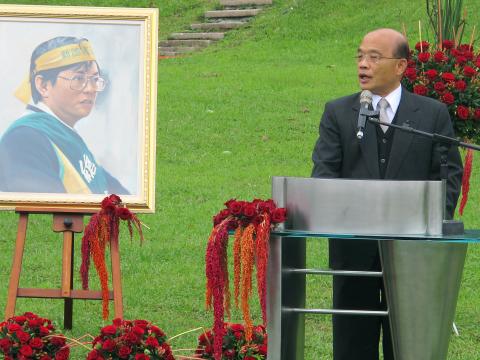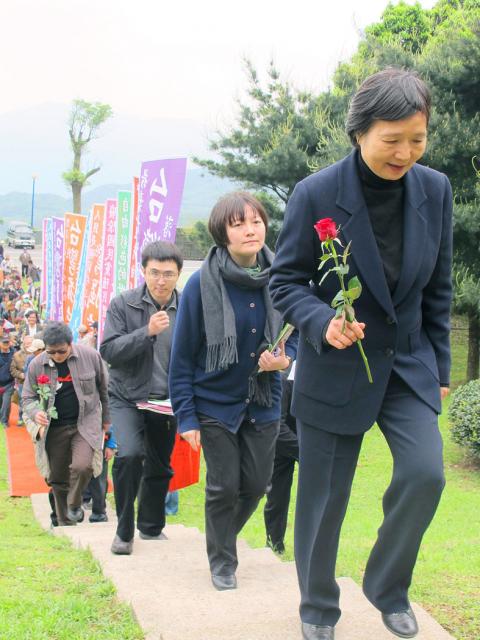Democratic Progressive Party (DPP) Chairman Su Tseng-chang (蘇貞昌) yesterday said that freedom in Taiwan has regressed since “a repressive government” had returned to power.
Su made the remarks at a ceremony in honor of Deng Nan-jung (鄭南榕), the late democracy advocate who set himself on fire 24 years ago and died in defense of “100 percent freedom of expression.”
The event took place at Deng’s tomb in New Taipei City’s (新北市) Jinbaoshan Cemetery in the morning.

Photo: Yu Chao-fu, Taipei Times
Su said it was a hard journey for Taiwanese to win the right of freedom of speech and it was made possible by people like Deng, who sacrificed himself.
Saying that 24 years ago there was no freedom in Taiwan under the then-authoritarian Chinese Nationalist Party (KMT) government, Su said people who had suffered from political repression or harassment knew that “certain words are said at home, not outside, or you could disappear or be caught anytime.”
However, Deng did not keep his mouth closed due to fear or threats, instead he spoke out, Su said.

Photo: Yu Chao-fu, Taipei Times
Deng spoke out not only with his mouth, but also by publishing his writings, he said.
He added that although Deng’s magazine Freedom Era Weekly (自由時代週刊) was banned, and permission for publishing the weekly was suspended again and again, he reapplied repeatedly and never gave up his intention in pursue democracy and freedom for the country.
Deng requested the authoritarian government to lift martial law, mark Feb. 28 an official memorial day for the 228 Massacre, and asked for a total freedom of expression, Su said.
He added that the KMT’s seizure, investigation, detention and imprisonment of Deng was intended to challenge his determination.
However, the KMT did not succeed, and it charged him with treason.
“Twenty-four years later, as we enjoy democracy and freedom of expression, we should not forget Deng’s spirit and the difficult road we have traveled,” Su said.
“After we have democracy, people voted for the then-authoritarian governors and allowed them to retain their power,” Su said.
Now they used more delicate and sophisticated ways to oppress freedom and democracy, Su said.
Freedom in Taiwan has been regressing since the KMT returned to power in 2008, and the US-based Freedom House has also said that freedom of the press in Taiwan has regressed, Su said.
Government propaganda is brainwashing people by saying that everything in China is good, while everything Taiwanese is bad, Su said.
Dealing with the situation, “people should appreciate what we own and learn to make right judgements,” Su added.
Born in Taiwan in 1947 to a family from China, Deng on numerous occasions in the 1980s overtly articulated his support for Taiwanese independence, at a time when a charge of sedition was in place to indict proponents of independence.
He established Freedom Era Weekly in 1984.
On April 7, 1989, he set himself on fire as heavily armed police attempted to break into his Taipei office, where he had barracaded himself for 71 days after he was charged with sedition for his magazine’s anti-government stance and for publishing a draft “Republic of Taiwan constitution” in 1988.

A preclearance service to facilitate entry for people traveling to select airports in Japan would be available from Thursday next week to Feb. 25 at Taiwan Taoyuan International Airport, Taoyuan International Airport Corp (TIAC) said on Tuesday. The service was first made available to Taiwanese travelers throughout the winter vacation of 2024 and during the Lunar New Year holiday. In addition to flights to the Japanese cities of Hakodate, Asahikawa, Akita, Sendai, Niigata, Okayama, Takamatsu, Kumamoto and Kagoshima, the service would be available to travelers to Kobe and Oita. The service can be accessed by passengers of 15 flight routes operated by

Chinese spouse and influencer Guan Guan’s (關關) residency permit has been revoked for repeatedly posting pro-China videos that threaten national security, the National Immigration Agency confirmed today. Guan Guan has said many controversial statements in her videos posted to Douyin (抖音), including “the red flag will soon be painted all over Taiwan” and “Taiwan is an inseparable part of China,” and expressing hope for expedited reunification. The agency last year received multiple reports alleging that Guan Guan had advocated for armed reunification. After verifying the reports, the agency last month issued a notice requiring her to appear and explain her actions. Guan

GIVE AND TAKE: Blood demand continues to rise each year, while fewer young donors are available due to the nation’s falling birthrate, a doctor said Blood donors can redeem points earned from donations to obtain limited edition Formosan black bear travel mugs, the Kaohsiung Blood Center said yesterday, as it announced a goal of stocking 20,000 units of blood prior to the Lunar New Year. The last month of the lunar year is National Blood Donation Month, when local centers seek to stockpile blood for use during the Lunar New Year holiday. The blood demand in southern Taiwan — including Tainan and Kaohsiung, as well as Chiayi, Pingtung, Penghu and Taitung counties — is about 2,000 units per day, the center said. The donation campaign aims to boost

The Central Weather Administration (CWA) said a magnitude 4.9 earthquake that struck off the coast of eastern Taiwan yesterday was an independent event and part of a stress-adjustment process. The earthquake occurred at 4:47pm, with its epicenter at sea about 45.4km south of Yilan County Hall at a depth of 5.9km, the CWA said. The quake's intensity, which gauges the actual effects of a temblor, was highest in several townships in Yilan and neighboring Hualien County, where it measured 4 on Taiwan's seven-tier intensity scale, the CWA said. Lin Po-yu (林柏佑), a division chief at the CWA's Seismological Center, told a news conference